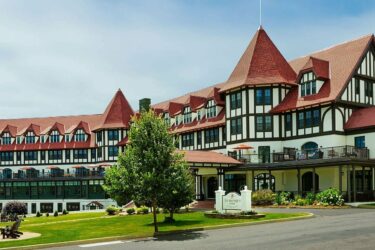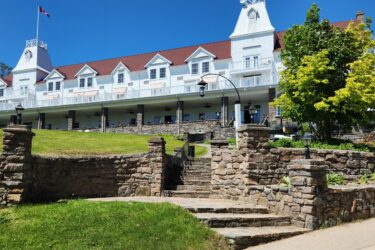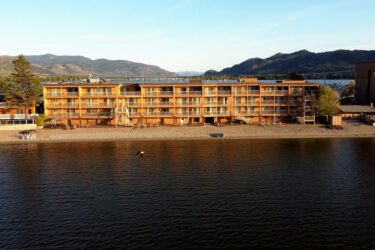
InnVest Hotels acquires The Algonquin Resort St. Andrews by‑the‑Sea, Autograph Collection and The Algonquin Golf Course
InnVest Hotels has acquired The Algonquin Resort St. Andrews by-the-Sea, Autograph Collection and The Algonquin Golf Course.
VANCOUVER — “Governments, city councils and the media are choosing to side with us when just three years earlier they thought Airbnb was the best thing to happen to communities…but we still have work to do,” Susie Grynol told WCLC.
By Peter Mitham
VANCOUVER – The battle against short-term rentals in Vancouver has been as much about protecting rental units as it has been a defense of hotels.
On November 7, the city announced that 18 months after enacting new regulations governing short-term rentals, 4,064 short-term rental business licences had been issued and more than 2,000 units and been permanently delisted. The number of active listings now totals 5,000.
Similar efforts to regulate short-term rental operators, who list residential units through online sites such as Airbnb, Booking.com and others have been made in Toronto, Montreal and Ottawa. Calgary is developing policies, and a province-wide initiative in Newfoundland and Labrador has been undertaken by the lodging industry and municipalities.
The work must continue, Susie Grynol, president of the Hotels Association of Canada, told the Western Canadian Lodging Conference in Vancouver on November 26.
“Governments, city councils and the media are choosing to side with us when just three years earlier they thought Airbnb was the best thing to happen to communities, and hotels were too expensive,” she said. “But we have more work to do. We need to keep mobilizing, and properly funding our fight against illegal commercial operators on platforms like Airbnb.”
A panel devoted to the topic of alternative accommodation at this year’s conference noted that the problem isn’t new, however.
Panel moderator David Ferguson, a director with CBRE Hotels in Vancouver, recalled how apartments used to be advertised for a month by executive lodging firms and leased for a few days. The tactic was eventually shut down, but it was a reminder that cunning operators will always find ways to skirt the rules.
Ferguson’s panellists – Emma Cahalane general manager for Vancouver of Sonder Inc., Peng Shen of the Chinese-language site Cozystay, and Ty Speer, president and CEO of Tourism Vancouver (he departed the role two days later) – discussed how lodging companies are legally bridging the divide between hotels and short-term rental sites.
Sonder, which opened in Toronto on December 1 and launches in Vancouver in February 2020, is what Cahalane described as a “technology-assisted hospitality company.” Her role as general manager for Vancouver will be to manage all Sonder units in the city. Services, from check-in to housekeeping requests, will be handled by mobile device. The units themselves are dispersed throughout the city, similar to what sites like Airbnb are offering.
“[Guests] are looking at different ways to experience the city,” remarked Speer.
The pay-off for Sonder is lower operating costs, which it passes on to guests. Units typically rent for 80 per cent of those in a full-service hotel. Guests are primarily couples and families.
Cozystay, for its part, works with Chinese online travel agencies to connect guests with the hotels it lists, which it operates under long-term lease agreements. Bookings are usually for groups of five or more. It currently has two properties in BC, the Abercorn Inn in Richmond and Lake Okanagan Resort near Kelowna, as well as one in Kitchener-Waterloo, Ontario. The properties total 400 rooms.
Shen said Cozystay’s emphasis is on tailoring services to guests.
“Service should be delivered when needed,” he said. “Different people need different levels of service.”
He sees the boom in short-term rentals as an expression of the customization hoteliers need to be able to deliver, particularly as the millennial generation coms to the fore. (By 2025, it’s expected to account for half of all travellers.)
“Millennials want to pay for the services that they want, and they don’t want to pay for the services that they don’t want,” he said.
Cozystay is targeting 1,000 units under management by the end of 2020 while Sonder hopes to have 5,000 units in Canada by 2022.
Those goals have Tourism Vancouver’s approval, which wants to grow the stock of local accommodation to meeting growing demand from meeting planners and travel groups. Without more rooms, the local tourism sector could be missing out on $2 billion worth of opportunities annually.
However, the need has to be met legally. Regulating Airbnb and similar sites is one step; providing competitive alternatives like Sonder is another.
“We want to make sure the way the market is operating is sensible,” Speer said. “Close a few of the gaps, and hotels will compete accordingly.”



InnVest Hotels has acquired The Algonquin Resort St. Andrews by-the-Sea, Autograph Collection and The Algonquin Golf Course.

The new owners of the famed Windermere House hotel and resort on Muskoka’s Lake Rosseau intend to revitalize the building and its amenities while preserving the property’s historical integrity.

Proactive Hospitality has acquired the Coast Osoyoos Beach Hotel, B.C. CFO Capital arranged acquisition financing for the deal.

Tribute Portfolio – part of Marriott Bonvoy's extraordinary portfolio of 31 hotel brands – continues to grow its global family of characterful hotels with Honeyrose Hotel Montreal, a Tribute Portfolio Hotel, the brand's…